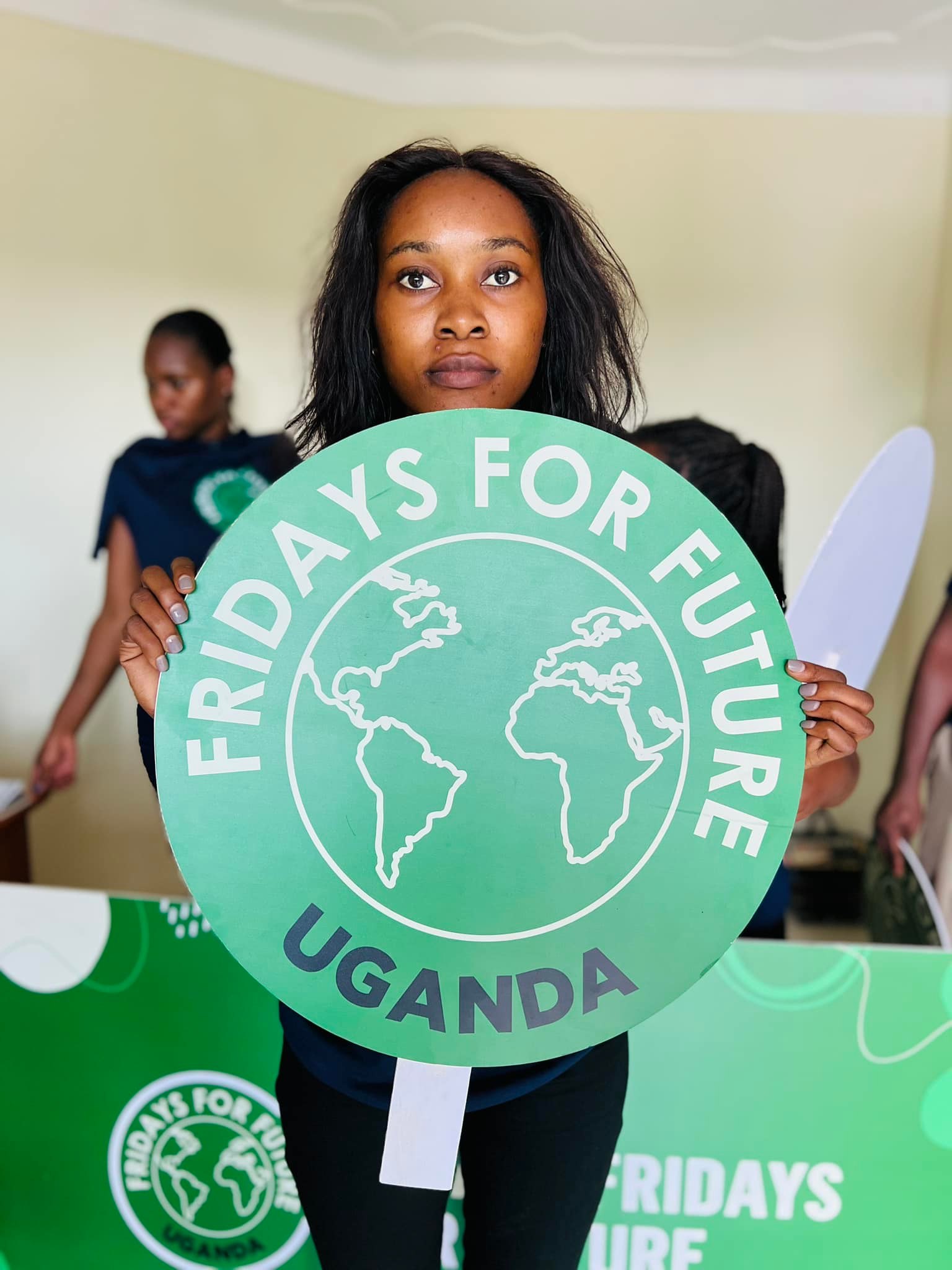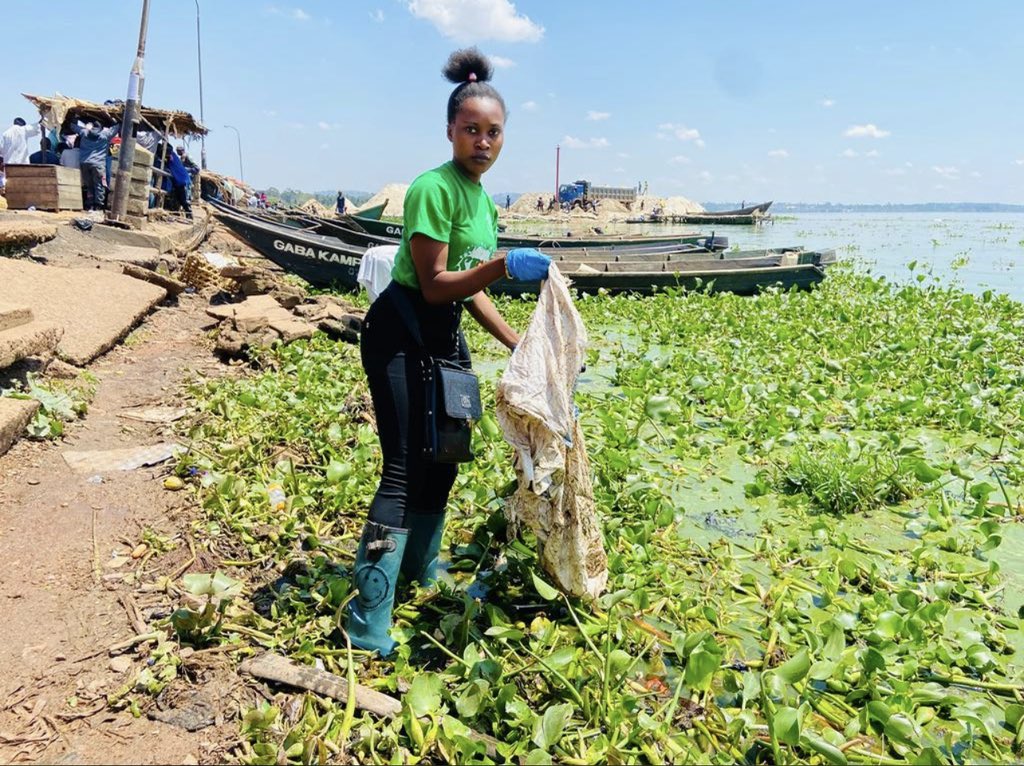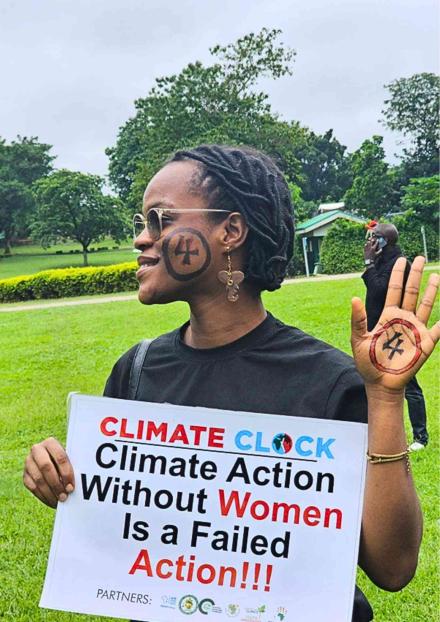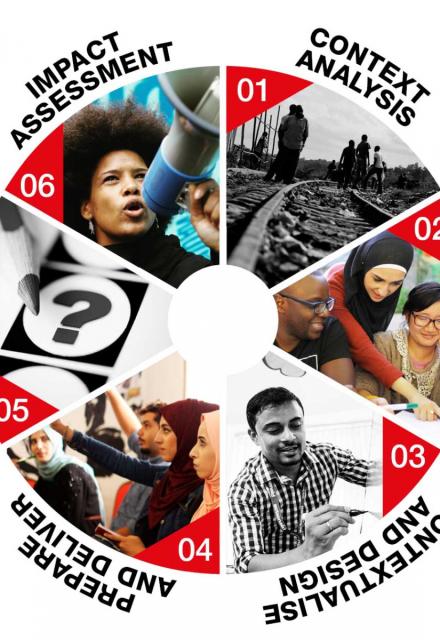What inspired you to become a climate activist?
Growing up in Nateete, Kampala, I witnessed firsthand the devastating impact of environmental destruction driven by corporate greed. Every rainy season, our community was hit by floods after wetlands, which acted as natural buffers, were cleared for development. My mother’s business would be submerged cutting off our source of income, schools closed, and roads became impassable.
Watching my vibrant community suffer year after year because of deliberate choices made in the name of profit shaped my path. I realized that what was happening in Nateete was not isolated. So many other communities in Uganda and across Africa face the same exploitation and neglect. This inspired me to stand up and speak out, to demand justice, protect our natural environment, and ensure that the voices of those most affected are heard and respected.
What do you do at Fridays for Future Uganda, and how has it shaped your activism?

At Fridays for Future Uganda, I organize, mobilize, and amplify the voices of young people demanding climate justice. We focus on grassroots actions, holding strikes, awareness campaigns, and community dialogues that shed light on how the climate crisis is affecting lives here in Uganda, especially vulnerable and marginalized communities.
I connect with people on the ground, especially those in areas affected by environmental degradation, oil projects, and land grabbing. We empower youth with knowledge and tools to advocate for change, and we also pressure decision-makers and financial institutions to stop funding destructive projects like the East African Crude Oil Pipeline (EACOP).
This has shaped my activism by grounding it in community. It’s taught me that the climate crisis is not just about statistics, it’s about real people, real stories, and real struggles. It has shown me the power of collective action and the importance of standing in solidarity with other activists around the world, especially from the Global South.
It’s also given me a platform to speak globally about what climate justice truly means: not just reducing emissions, but centering equity, dignity, and survival for all.
What motivated you to start the Stop Wetland Degradation and Stop Plastic Pollution Campaigns?

The deep connection I have with my community and the environment we depend on. Growing up, I saw wetlands, our lifelines, being destroyed for construction and corporate expansion, leading to constant flooding and disruption of daily life. Their destruction wasn’t just an environmental issue; it was a social and economic one. Families lost homes, businesses like my mother’s were affected, and public health risks increased.
At the same time, plastic waste choked our drainage systems, littered our streets, and contaminated water sources. It became clear to me that we couldn’t talk about climate action without addressing these two issues head-on. Wetland degradation and plastic pollution were and still are two of the most visible, urgent environmental crises in Uganda, and they need urgent attention. I started these campaigns to raise awareness, push for better policies, and mobilize communities to act.
The #StopEACOP (East Africa Crude Oil Pipeline) campaign which you are also involved in has gained global attention—what are the main concerns, and what has been your role?

The campaign has gained global attention because it exposes a powerful example of environmental injustice and corporate overreach. At its core, the project reflects corporate exploitation, putting profits above people, communities, and the environment. EACOP threatens to worsen the climate crisis at a time when we should be transitioning away from fossil fuels, not expanding them.
The main concerns around EACOP are that it threatens to displace over 100,000 people in Uganda and Tanzania without fair compensation, the destruction of critical biodiversity areas like forests, wetlands, and national parks, risks contaminating Lake Victoria, a main water source for over 40 million people, and significant climate impact with the potential to emit up to 34 million tons of CO₂ annually.
My role has been to support affected communities, help them understand their rights, document their stories, and organize for resistance. I also advocate globally speaking at events, engaging with financial institutions, and building solidarity with global movements. I’ve participated in direct actions, social media campaigns, and press engagements to amplify the urgent call: Stop EACOP.
#StopEACOP is deeply personal: it’s about protecting my community, our people, and ensuring our future is not sacrificed for profit. It’s about saying no to systems that exploit us, and yes to justice, sustainability, and dignity.
What is the biggest challenge you face as an activist from the Global South, and what makes you most angry about the climate crisis?
One of the biggest challenges is being heard and taken seriously on the global stage. Despite being among the most affected, the voices of activists from the Global South are often sidelined in global climate discussions. There's a clear imbalance in who gets the platforms, the resources, and the decision-making power.
What angers me most about the climate crisis is the fact that those of us who contribute the least to it—like my community—are suffering the most. It is unjust heartbreaking to see people lose everything while the biggest polluters continue their destructive practices, protected by profit and power. The system is broken, and that injustice is what fuels my activism every day.
What is one misconception about climate activism that frustrates you the most?
People often reduce climate activism to holding signs and shouting slogans, protests, and photos. But it’s so much deeper than that.
For us, activism is not a choice—it’s a necessity, It’s a fight for survival and justice. We’re up against powerful corporations, governments, and systems that are destroying our environment and displacing our communities.
It takes courage, sacrifice, and emotional labour. Reducing it to a “feel-good” activity completely ignores the risks and realities we face on the ground. Activists are often killed, kidnapped, detained, and arrested. This is more than sacrifice. It is selflessness!
You are about to deliver a letter at the HSBC AGM from activists in the Global South—what is the key message, and why is this moment so critical?

My message is simple: they have a responsibility to stop financing projects which threaten the environment and vulnerable communities. It’s time to choose people over profits and invest in a sustainable, just future for all. Financial institutions like HSBC have the power to either support destructive projects or contribute to a sustainable future.
This is an opportunity to challenge them directly and demand that they prioritize human rights and environmental protection in their investments. This moment is crucial because it’s a chance to demand that HSBC and other financial institutions prioritize people over profits. We can no longer afford to allow profit-driven motives to destroy our communities and our future.
What do you wish big banks like HSBC and Barclays understood about climate change, and what concrete actions should they take?
Climate change is a human rights issue, and vulnerable communities in the Global South whose survival depends on responsible financial decisions are already bearing the brunt of environmental destruction.
Big banks must stop financing fossil fuel projects and invest in clean energy and sustainable solutions. They should adopt stricter environmental, social, and governance (ESG) policies that meet high environmental and human rights standards and fund climate adaptation projects to help communities build resilience. Banks must also be more transparent and accountable, showing the real impact of their investments on people and the planet. Their financial decisions have the power to either exacerbate or mitigate the climate crisis.
How do climate justice and gender justice intersect in your work?
These issues are deeply connected and in my work, I see firsthand how the impacts of climate change disproportionately affect women, especially in marginalized communities.
Women are often the primary caregivers and providers of food and water. When climate change disrupts these resources, they bear the brunt of the crisis, yet they are often excluded from decision-making processes around climate policies and solutions.
I focus on empowering women, ensuring their voices are heard, and advocating for gender-responsive climate policies while highlighting the critical role women play in building sustainable solutions. At the same time, I aim to address the gendered dimensions of climate change, where women’s resilience and leadership are often overlooked or undervalued.
This fight is also for social equity, ensuring that the most affected are central to the solutions. These two struggles must go hand in hand if we are to create a just and sustainable future for all.
If you could change one law today to advance climate justice, what would it be?
I would enforce mandatory climate impact assessments for all major development projects, especially those funded by banks and multinational corporations. These assessments would help to ensure that the environmental, social, and human rights impacts of projects like EACOP are fully understood and accounted for before the projects are approved.
This law would hold corporations and governments accountable for their role in the climate crisis and prevent destructive projects from proceeding while empowering local people to resist harm, and push for sustainable, people-centered development.
How do you practice self-care, and what keeps you going on the hardest days?
This is a deeply emotional question for me because where I come from, mental health is often overlooked. Activism can be draining, especially when you’re fighting for communities that are constantly overlooked and it feels like progress is slow. On top of that, I have my family to care for: a sick mother and siblings who are both my strength and my worry. Balancing activism with family responsibilities is hard, and sometimes it feels like the pressure of life outside activism can overwhelm you.
On the hardest days, what keeps me going is the communities I fight for. Their courage to stand up for their land, rights, and future reminds me that change is possible. The strength of fellow activists also fills me with determination, knowing that we’re all in this together, all pushing for the same cause. They remind me that change is possible, even when the journey seems tough.
What is one climate victory or moment in your activism journey that reminds you that change is possible?
Helping reduce the financing for EACOP by pushing major banks, including HSBC and Standard Chartered, to withdraw funding from EACOP. This was a significant win, as the project was initially set to receive over $3.5 billion in funding from international banks.
Seeing the collective impact of activism from communities on the frontlines demonstrated the power we have when we hold corporations and financial institutions accountable and that even small victories can spark large-scale change. That victory reinforced my belief that even in the face of immense power and adversity, collective action has the ability to reshape the future.
If people reading this interview could do just one thing everyday to help the planet, What should it be?
Each one, teach one. Talk to someone about the dangers of environmental destruction and the importance of protecting our planet. Real change begins with awareness. Show them that safeguarding the environment also means preserving our cultures, traditions, and languages, and securing a safe, sustainable future for the generations to come.
If each person educates and inspires just one other person every day, we can create a powerful ripple effect. It will take all of us, together, to create the world we deserve.
If you could sit with one world leader for an hour, who would it be, and what would you say?
David Malpass, President of the World Bank. I would urge him to recognize the urgent need for climate justice and shift the World Bank’s investments and policies toward supporting vulnerable communities, especially in the Global South. The World Bank has the power to redirect funds toward green technologies, renewable energy, and climate resilient projects. I would ask him to prioritize these areas and reconsider the distribution of financial resources to ensure that vulnerable communities in the Global South are not left behind without the necessary support to address the effects of climate change.
Additionally, there needs to be a stronger emphasis on debt cancellation or climate financing for low-income nations, so that they are not burdened by debt while trying to rebuild and adapt to climate impacts.
If your activism had a theme song, what would it be?
Teach the world by Lucky Dube



